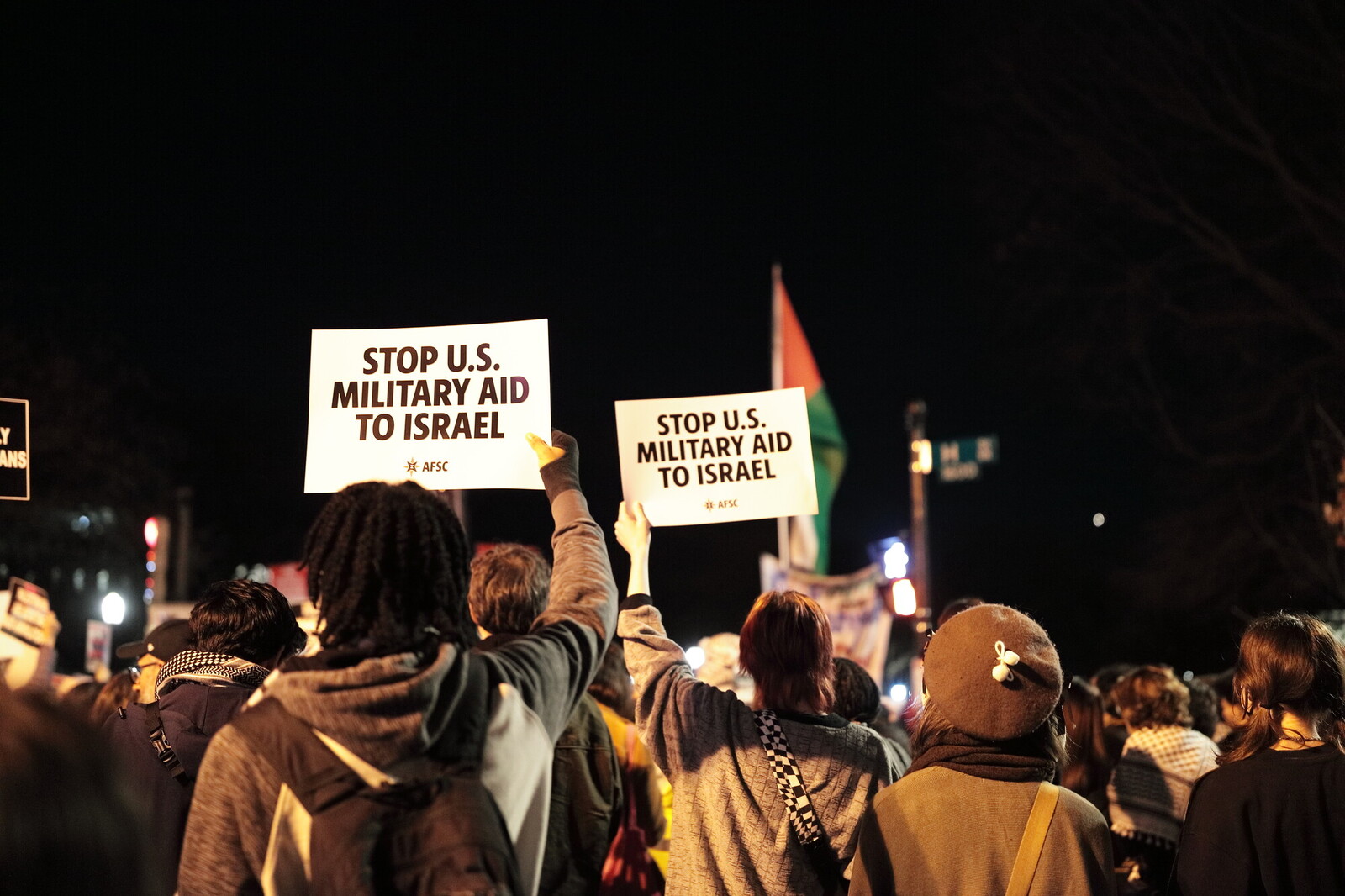
Since the start of Israel’s genocide, people across the U.S. have become increasingly aware of how their tax dollars fund Israel’s military assaults on Palestinians in Gaza. According to a CBS/YouGov poll in June 2024, at least 61% of American adults agreed that the U.S. must stop sending weapons to Israel.
At the same time, migrant communities are facing terrifying attacks, including abductions by plainclothes deportation agents. ICE and DHS raids increased by more than 620% during Trump’s first month in office.
U.S. militarization is rapidly escalating and endangers the lives of hundreds of thousands across the country. At the same time, our government funds mercenaries who have directly participated in the killing of over 1,000 Palestinians at an aid site in Gaza.
We know our struggles are interconnected, and that justice and human rights for all are inseparable. Rooted in our Quaker values, AFSC works to advance just migration, just economies, and global peace across many regions — from humanitarian work in Palestine to migrant advocacy along the U.S.–Mexico border.
That’s why we’re highlighting the work of activists, policy advocates, and leaders who work every day to defend migrant rights, protect freedoms of speech, and support Palestinians’ right to life. We’re honored to feature Congresswoman Delia Ramirez, whose own family has been impacted by the Trump administration’s anti-migrant policies, and who introduced the first-ever bill to halt major weapons transfers to Israel: the Block the Bombs Act.
The Block the Bombs Act calls for a full prohibition on major weapons, including 5,000 lb bombs, 2,000 lb bombs, JDAMs (guidance kits attached to bombs), tank ammunition, and artillery rounds — all of which have been repeatedly used in documented attacks on civilians during Israel’s ongoing genocide in Gaza.
Here are seven powerful statements from our “Stop ICE Abductions & Block the Bombs” webinar:
1. “I’ve seen ICE agents take away mothers from their children, push away attorneys from their clients – disregarding due process – and two weeks ago in San Diego, ICE agents arrested a court observer, a grandmother, and held her for hours. This is an act of retaliation because ICE agents would prefer to carry out their misconduct behind closed doors with nobody watching.” – Pedro Rios
2. “[The call for] ceasefire is very limited and almost meaningless in that the US continues to supply weapons that are used so that Israel can be that belligerent actor across the region, also acting in complete disregard of international humanitarian law, and carrying out the genocide we see to this day.” – Brad Parker
3. “It’s not going to pass. And I think that’s one thing that is confusing sometimes for people. What are we doing with legislation that has no chance of passing? [...] What we use these legislative vehicles to do is to build support around the underlying issue, use them as a vehicle to help activists and individuals engage with members of Congress so they can talk with them about the issue. It gives something that provides a trajectory for grassroots momentum and outrage to be channeled into a specific policy vehicle to force change at the congressional level.” – Brad Parker
4. “My case is a clear example of the weaponization of the immigration system to achieve political gain, whether it is because I’m Palestinian, but also we’re seeing that they’re using immigration as a tool to suppress any kind of speech that they don’t like.This is what’s scary about this. This government is acting as if there’s no limit to their cruelty, to the levels of their dehumanization that they’ve been inflicting on a lot of us. ”
5. “Recently we now know – confirmed by Trump administration officials themselves – that ICE relied on Canary Mission and Betar, a shadowy organization to identify and target pro-Palestinian student activists. That’s how I ended up in detention, not because I broke any laws, but because I spoke out. Because I dared to say that Palestinians deserve to live in freedom and dignity. Because I protested the bombing of Palestinians.”
6. “As I think about it, I think about the work that we’re doing together. And I’m clear that from Palestine to Chicago, our communities are confronting the pain, the fear, and the violence of unaccountable leaders waging connected campaigns of terror against our neighbors, our families, and loved ones.”
7. “We have to stay informed. We have to stay organized. And we have to keep resisting. Because we understand that the unlawful actions used against immigrants and Palestinians today will be used tomorrow against anyone who they consider undesirable. Because we know that fascism always demands a public enemy. But it is in this moment that we see our collective solidarity. That we keep building and organizing together because not one more life should die with our taxpayer dollars. It is why Block tha Bombs bill is so critically important – and the connections between what’s happening with homeland and what’s happening in Palestine.”
